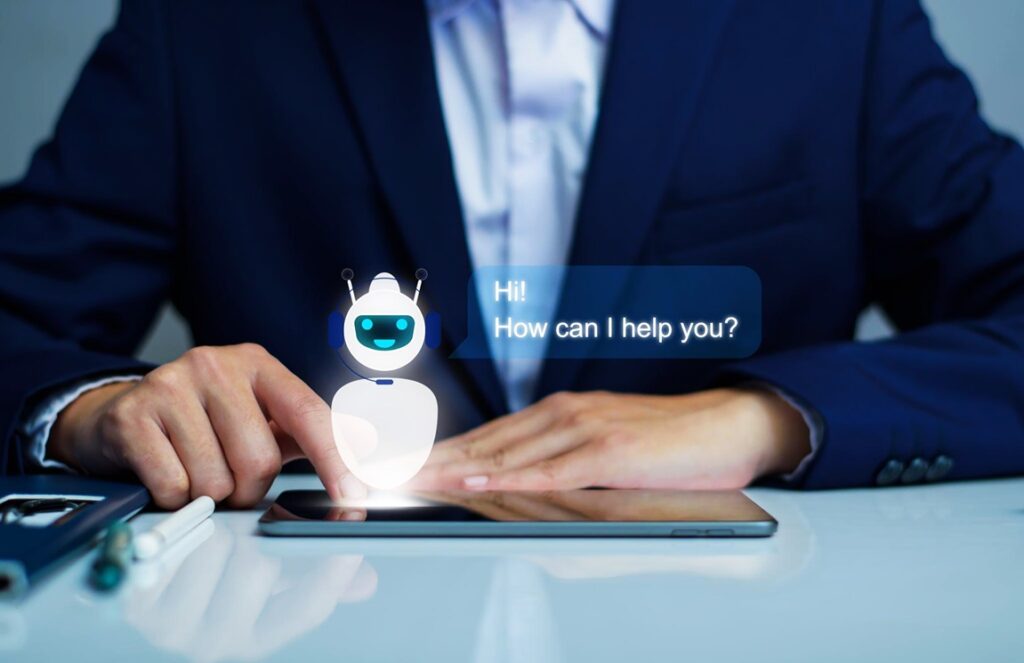Der Einsatz von Künstlicher Intelligenz (KI) im Recruiting nimmt zu, doch viele Kandidaten stehen der Technologie skeptisch gegenüber. Welche Vorteile ziehen Recruiter aus KI und wie können sie die Skepsis der Bewerber verringern?

Der Einsatz von Künstlicher Intelligenz (KI) im Recruiting nimmt zu, doch viele Kandidaten stehen der Technologie skeptisch gegenüber. Welche Vorteile ziehen Recruiter aus KI und wie können sie die Skepsis der Bewerber verringern?
Wie kann Künstliche Intelligenz bei der Personalbeschaffung unterstützen? Dieser Frage hat sich eine Stepstone Studie angenommen. Laut ihr sehen die befragten Recruiter folgende Vorteile für ihre Arbeit:
Neben dem Riesen-Potential für den gesamten Recruiting-Prozess, kann Künstliche Intelligenz auch den Personalern ganz individuell im Arbeitsalltag weiterhelfen. Bekannte KI Tools fürs Recruiting sind bspw. ChatGPT, das u. a. beim Verfassen von Jobbeschreibungen oder Kandidaten-Anschreiben unterstützen kann, die AI-Funktion von “Clickup” für effizientes Projektmanagement oder “Beautiful AI” für die Erstellung von Präsentationen im Recruiting.
Ja, Künstliche Intelligenz ist schon längst keine Zukunftsmusik mehr. Sie findet bereits in verschiedenen Bereichen Anwendung – so auch im Recruiting. Die folgenden Beispiele sollen klar machen, dass KI längst in der Personalbeschaffung angekommen ist und zukünftig wohl noch weiter ausgebaut wird.
KI-Anwendungen analysieren Lebensläufe und Bewerbungen, um die besten Kandidaten für offene Stellen zu identifizieren. Sie können – mit entsprechendem Training – bspw. Social Media Kanäle und Foren nach Talenten mit spezifischen Anforderungen durchforsten. Durch maschinelles Lernen können die KI-Systeme kontinuierlich dazulernen und ihre Auswahlkriterien optimieren, um die besten Übereinstimmungen zwischen dem Anforderunsprofil für eine Position und den Fähigkeiten der Bewerber herauszufiltern.
Chatbots und virtuelle Assistenten bieten Bewerbern rund um die Uhr Unterstützung und können grundlegende Fragen beantworten, Terminvereinbarungen treffen und Informationen über offene Stellen bereitstellen. Sie erhöhen die Benutzerfreundlichkeit von Bewerberportalen und reduzieren den administrativen Aufwand für das Recruiting-Team. Chatbots eignen sich auch hervorragend, um Feedback der Kandidaten zu sammeln. Ein verbreitetes Tool zum Erstellen von Chatbots ist “Power Virtual Agents”.

KI kann historische Daten und Erfolgsfaktoren nutzen, um Vorhersagen über die Eignung von Bewerbern zu treffen. Diese Vorhersagen ermöglichen es Unternehmen, besser zu verstehen, welcher Kandidat wahrscheinlich am besten zur Unternehmenskultur und zur offenen Position passt. Predictive Analytics kann so den Auswahlprozess optimieren und die Qualität der Einstellungen verbessern. Ein bekanntes KI Tool, das derartige Prognosen entwickeln kann, ist “Sisense”.
Bei KI-basierten Vorstellungsgesprächen werten Algorithmen die Antworten im Anschluss an das digitale Interview aus, dabei werden Fachwissen genauso wie Soft Skills (Kommunikationsfähigkeit, Teamgeist etc.) bewertet. Die Bewertung der KI entscheidet mit, ob der Kandidat in die engere Auswahl kommt oder eine Absage erhält – der Auswahlprozess wird so beschleunigt und das Matching lässt sich verbessern. Ein bekanntes Programm, das KI-basierte Videointerviews aufzeichnet, ist “HireVue”.
KI ermöglicht datengesteuerte Entscheidungsfindung im Recruiting. Dabei steht die Analyse großer Datenmengen im Fokus. Diese umfassen nicht nur die Interpretation von Bewerberdaten, sondern bspw. auch die Auswertung von Interaktionsdaten, wobei die Interaktionen von Kandidaten mit dem Unternehmen analysiert werden. Auch für Performance Analytics kann Künstliche Intelligenz zum Einsatz kommen. Dabei können anhand von umfangreichen Datenauswertungen bspw. Recruiting-Strategien und -Kanäle bewertet werden. Solche Datenanalysen lassen sich mit KI Tools wie bspw. “Julius AI” oder “Scale” durchführen.

KI kann dazu beitragen, den Qualifikationsbedarf eines Unternehmens zu identifizieren, indem sie vorhandene Mitarbeiterprofile und Anforderungen an offene Positionen analysiert. Unternehmen können Schulungs- und Weiterbildungsprogramme gezielt entwickeln, um Mitarbeiter weiterzubilden und Engpässe bei bestimmten Fähigkeiten zu beheben. Skill-Gap-Analysen unterstützen die langfristige Personalplanung und die Entwicklung von Mitarbeitern.
KI kann dazu beitragen, Vorurteile und Diskriminierung im Bewerbungsprozess zu minimieren, indem sie objektive Kriterien bei der Auswahl von Kandidaten verwendet. Sie kann auch voreingenommene Sprache oder diskriminierende Formulierungen in Stellenanzeigen oder Lebensläufen erkennen und vermeiden. Durch die Integration von KI-Tools in den Auswahlprozess können Unternehmen ihre Bemühungen um Diversität und Inklusion verstärken und sicherstellen, dass die besten Talente unabhängig von persönlichen Merkmalen ausgewählt werden.
Immer mehr Recruiter sehen Quereinsteiger als Lösung für den Fachkräftemangel. Von Entscheider-Seite gibt es jedoch häufig Zweifel, u. a. weil die Einarbeitung zu aufwendig wäre. Künstliche Intelligenz kann hier unterstützen: Mitarbeitende können beim Onboarding von Quereinsteigenden entlastet werden, indem KI-gestützte Lernplattformen zur Schulung und Weiterbildung zum Einsatz kommen.

AI-basierte Systeme können auch die Planung von Vorstellungsgesprächen automatisieren. Indem sie die Verfügbarkeit der Recruiter und Bewerber berücksichtigen, können KI-Tools effizient Zeitpläne koordinieren und automatisch Termine planen. Dies spart nicht nur Zeit, sondern minimiert auch mögliche Terminüberschneidungen und erleichtert den gesamten Planungsprozess. “Calendly” ist zum Beispiel ein bekanntes Terminplaner-Tool, das zunehmend auf KI setzt.
KI-Chatbots können dazu verwendet werden, langfristige Beziehungen zu Talenten aufzubauen. Sie können regelmäßig mit Talentpools interagieren, aktuelle Informationen bereitstellen, Karrierechancen teilen und Fragen beantworten. Durch die kontinuierliche Pflege von Beziehungen zu potenziellen Kandidaten bleibt das Unternehmen in ihrem Gedächtnis, wenn passende Positionen verfügbar werden.
Bei all den Vorzügen muss natürlich erwähnt werden, dass KI nicht frei von Fehlern ist. So kann sie im Recruiting auch ethische und rechtliche Herausforderungen mit sich bringen, insbesondere im Hinblick auf Datenschutz und Diskriminierung. Außerdem ist der menschliche Faktor nach wie vor entscheidend, da KI-Systeme nicht in der Lage sind, die gesamte Bandbreite menschlicher Fähigkeiten und Qualitäten zu bewerten.
Derartige Bedenken sind auch unter Bewerbern stark verbreitet. Das hat eine Studie der Internationalen Hochschule (IU) herausgefunden: 64,7 % der Befragten stehen Künstlicher Intelligenz in Bewerbungsprozessen ablehnend gegenüber und bewerten die technologische Entwicklung als negativ.
Das sind die 6 größten Nachteile von KI im Bewerbungsprozess laut Umfrage der IU:
Die Bewerber sehen insbesondere „Unpersönlichkeit“ als großen Nachteil. Den „Faktor Mensch“ missen viele der Befragten, zugleich sehen sie ihn aber auch als Risiko – weil er die KI falsch programmieren könnte.
Interessant auch: Während Kandidaten dem Einsatz von Künstlicher Intelligenz seitens Unternehmen eher skeptisch gegenüberstehen, nutzen sie selbst laut einer softgarten-Studie offenbar immer häufiger Algorithmen zur Erstellung von Bewerbungen.
Unternehmen können die Skepsis vieler Bewerber gegenüber KI im Recruiting verringern. Hier sind mögliche Schritte, die eingeleitet werden können:

Das Angebot an KI-Anwendungen steigt – und viele davon sind für das Recruiting nützlich oder sogar extra dafür entwickelt. In vielen Bereichen des Recruitments hat sich der Einsatz von Künstlicher Intelligenz schon jetzt etabliert und dient als Entscheidungshilfe. Der Trend geht also in eine eindeutige Richtung und es dürfte nur eine Frage der Zeit sein, bis Recruiter KI-Algorithmen selbstverständlich für ihre Arbeit nutzen.
Wichtig ist dabei, Zweifel und Sorgen von Kandidaten, aber auch bspw. von Kollegen oder Vorgesetzten ernst zu nehmen, aktiv Fehlern und Gefahren entgegenzuwirken und fortlaufende Optimierungen vorzunehmen.
Trotz des AI-Trends bleibt außerdem festzuhalten: Künstliche Intelligenz kann Recruiter zwar unterstützen, aber niemals ersetzen. Denn ob wir jemanden einstellen möchten, entscheiden am Ende wir Menschen selbst. Schließlich sind wir es, die dann mit diesen neuen Mitarbeitern zusammenarbeiten.
(Quelle Titelbild: https://de.freepik.com/fotos-premium/attraktive-geschaeftsfrau-im-weissen-hemd-am-arbeitsplatz-die-mit-laptop-arbeitet-um-neue-mitarbeiter-fuer-die-internationale-unternehmensberatung-hr-social-media-hologrammsymbole-ueber-buerohintergrund-einzustellen_37497772.htm by videoflow)